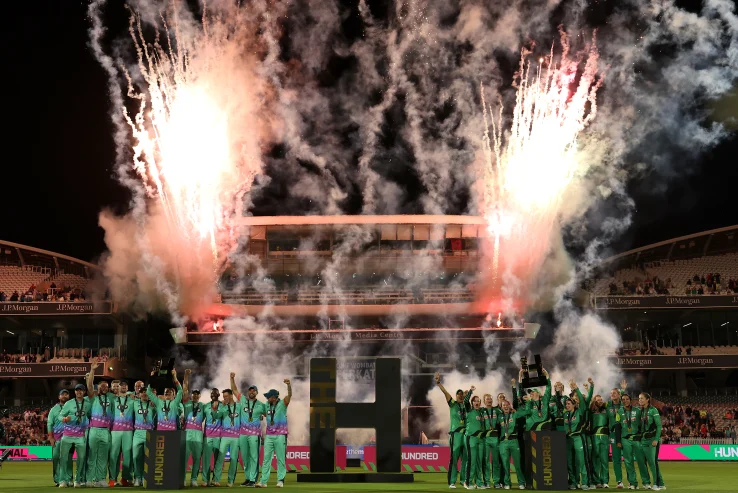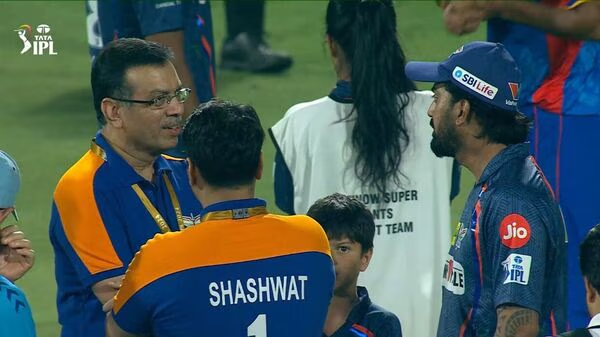Eight teams collectively valued at over £650 million
The Hundred, a relatively new cricket tournament in England, has quickly captured the interest of high-profile global investors. With the tournament’s eight teams collectively valued at over £650 million, high-profile names like Chelsea director Jonathan Goldstein, India’s wealthiest family, the Ambanis, and even some members of the Glazer family have thrown their hats into the ring, signaling a potential windfall for English cricket. The England and Wales Cricket Board (ECB), working with advisers Deloitte and Raine Group, expressed delight at the level of interest, with more than 100 bids submitted during the first round of bidding.

Ambanis, Sanjiv Goenka Bids in Hundred
Most notably, Indian billionaire Sanjiv Goenka, owner of the IPL franchise Lucknow Super Giants, has reportedly put forward the highest bid so far, valuing London Spirit, the team based at Lord’s, at an astonishing £140 million. The Ambanis, owners of Mumbai Indians, have also shown significant interest, although reportedly at a lower valuation than Goenka’s. Additionally, Oval Invincibles, another team, has also attracted offers of around £120 million from another IPL team owner, while six other franchises have seen bids reaching up to £80 million.

Glazers Family Bidding
A diverse mix of bidders, including American sports owners, private equity firms, and most IPL team owners, has entered the fray, highlighting the level of global excitement for The Hundred. Notably, Jonathan Goldstein has engaged Raine Group independently of his association with Chelsea and is reportedly collaborating with partners on a proposal, though it remains unclear which team he intends to invest in. Meanwhile, several Glazer siblings, who recently sold a major stake in Manchester United to Ineos, are also eyeing The Hundred, adding further intrigue to the bidding process.
ECB retains some control
The ECB has adopted an innovative model for the sale, where only 49 percent of each team’s stake is initially up for grabs. This approach ensures that the ECB retains some control while injecting fresh funds into the game. Host venues will hold the remaining 51 percent, though they can choose to sell a portion or retain full control if they prefer. Surrey, for example, which hosts Oval Invincibles, has shown interest in keeping its entire 51 percent stake, as they value maintaining control over the franchise’s cricketing operations.
ECB invests in Grassroots Cricket
With valuations for each team on the rise, the ECB is optimistic that the sale could generate more than £500 million just for the 49 percent stakes. The final split of proceeds has also been meticulously planned. According to the ECB’s model, the first 10 percent will support grassroots cricket, with the rest shared among the counties. In addition, the initial £275 million will be divided among all 18 first-class counties and the MCC (owners of Lord’s), while the next £150 million will go to the 11 counties that aren’t hosting Hundred teams. Any proceeds above £425 million will once again be shared equally among the 18 counties and MCC.
ECB Plans for Utilization of Revenue
For counties facing financial challenges, this injection of funds could provide much-needed relief. However, the ECB intends to impose strict regulations on how this revenue is utilized to ensure that it’s used for sustainable development and not just short-term fixes.
Investor’s Heavy Interest in Hundred
New investors in The Hundred will stand to gain significantly from the tournament’s broadcast, ticket, and sponsorship revenue, receiving up to 80 percent of the income. Additionally, the introduction of external investment could lead to changes in team identities and likely increased player salaries in both men’s and women’s competitions, making the league more competitive and attractive. The ECB’s planned reforms come at a time when English cricket has been seeking ways to make itself more financially viable and appealing to a wider audience.
The next steps in the sale process will involve separating the sale of the eight teams, each with its shortlist of interested buyers. During this stage, prospective investors will tour the venues and meet with representatives from the host counties. This will allow them to gauge the potential and working conditions of each franchise. Although the ECB hasn’t set a fixed deadline for the process, they aim to have the investments finalized by spring next year. This could enable some teams to benefit from new funding by the upcoming season, the tournament’s fifth, though it remains uncertain if every team will have completed deals by then.
London Spirit, with its high valuation and prestige as a Lord’s-based franchise, may take longer to finalize a deal due to MCC’s involvement. The MCC recently held a special general meeting to decide whether to accept the ECB’s 51 percent gift to the team, with the decision expected soon. This step is crucial, as MCC’s stake in London Spirit is a potential sticking point in the franchise’s sale and could influence the terms of the investment.
Conclusion
Ultimately, the interest in The Hundred is a positive indicator of English cricket’s financial health. With major global entities like the Ambanis, Goenka, and the Glazers showing interest, the ECB could leverage this investment to stabilize and grow the sport, from grassroots to elite levels. The high valuations and diverse pool of bidders are a strong endorsement of The Hundred’s appeal and could lay the foundation for a financially sustainable future for the sport in England. The funds raised could support domestic cricket at all levels, ensuring a bright future for England’s cricketing ecosystem.